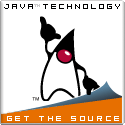Oracle Java

The Java technology logo
|
|
| Original author(s) | James Gosling, Sun Microsystems |
|---|---|
| Developer(s) | Oracle Corporation |
| Initial release | 23 January 1996 |
| Stable release | 8 Update 144 Build 01 (1.8.0_144-b01) (July 26, 2017) |
| Preview release | 9 Build 180 (July 28, 2017) |
| Written in | Java, C++ |
| Operating system | Windows, Solaris, Linux, OS X |
| Platform | IA-32, x64, ARMv7, ARMv8, SPARC |
| Available in | English, Chinese, French, German, Italian, Japanese, Korean, Portuguese, Spanish, Swedish |
| Type | Software platform |
| License | Freeware, mostly open-source, with a few proprietary components |
| Website | www |
Java is a set of computer software and specifications developed by Sun Microsystems, which was later acquired by the Oracle Corporation, that provides a system for developing application software and deploying it in a cross-platform computing environment. Java is used in a wide variety of computing platforms from embedded devices and mobile phones to enterprise servers and supercomputers. While they are less common than standalone Java applications, Java applets run in secure, sandboxed environments to provide many features of native applications and can be embedded in HTML pages.
Writing in the Java programming language is the primary way to produce code that will be deployed as byte code in a Java Virtual Machine (JVM); byte code compilers are also available for other languages, including Ada, JavaScript, Python, and Ruby. In addition, several languages have been designed to run natively on the JVM, including Scala, Clojure and Apache Groovy. Java syntax borrows heavily from C and C++, but object-oriented features are modeled after Smalltalk and Objective-C. Java eschews certain low-level constructs such as pointers and has a very simple memory model where every object is allocated on the heap and all variables of object types are references. Memory management is handled through integrated automatic garbage collection performed by the JVM.
...
Wikipedia
